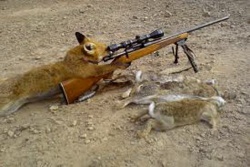Hunting
Hunting (migavā) is the stalking, chasing and killing of wild animals. In prehistoric times and even today amongst some primitive tribes, people have hunted to provide themselves with food or to supplement their diets. In later periods hunting was sometimes seen as a way to train for war. Today nearly all hunting is done for sport, entertainment or as proof of courage. Buddhism has always disapproved of hunting because it involves cruelty and killing and is in most cases unnecessary. The Buddha said that fowlers (sākuṇika), deer stalkers (māgavika) and fishermen (macchaghātaka) might all have an unfavorable rebirth (A.II,207; S.II,256). The early Buddhists also criticized using animals, e.g. dogs, hawks, cheetahs, etc. to hunt other animals (Ja.V,270), and using one animal as a decoy to catch another (Ja.V,375). Buddhist kings rarely indulged in hunting and few palaces or royal residences in Buddhist countries are decorated with hunting scenes, as are those in many other cultures. Several Jātaka stories criticize hunting for sport and try to evoke sympathy for the victimized animals (Ja.I,145-54). See Blood Sports.
